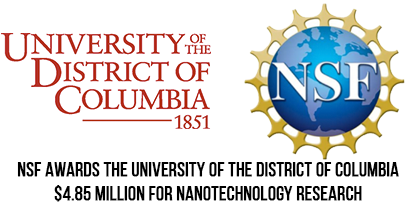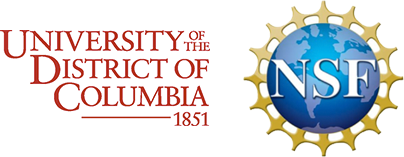
NSF Awards the University of the District of Columbia $4.85 million for Nanotechnology Research

July 30, 2019
FOR IMMEDIATE RELEASE
Contact: John Gordon, Jr. Communications Director
202.274.5998 (o) or 202.697.1310 (c) or john.gordon@udc.edu
Click here to download the press release.
NSF AWARDS THE UNIVERSITY OF THE DISTRICT OF COLUMBIA
$4.85 MILLION FOR NANOTECHNOLOGY RESEARCH
Washington, DC – The National Science Foundation (NSF) has awarded the University of the District of Columbia (UDC) $4.8 million over the next five years to establish a Center for Nanotechnology Research and Education (CNRE) as part of the NSF Center of Research Excellence in Science and Technology (CREST) Program. The CNRE’s mission is to utilize UDC faculty’s core expertise in nanotechnology to establish a nationally recognized center of excellence to realize UDC’s goals of supporting student research and professional development. Currently, UDC is one of the fifteen ABET-accredited HBCU engineering programs in the United States.
According to Dr. Devdas Shetty, Dean of the School of Engineering and Applied Sciences (SEAS), the Center will develop beneficial partnerships and collaborations that will enable UDC to gain national and international significance in nanotechnology research.
“I am extremely excited about the CREST Center and its priority support of student research, including those pursuing doctoral studies,” says Shetty. “The Center will enable UDC faculty to showcase their core expertise in advanced manufacturing and establish a nationally recognized center of excellence.”
UDC’s faculty will conduct nanotechnology research in areas such as nanoscale electronics for next-generation computers, metal additive manufacturing, and nanomaterials-based energy systems. Most importantly, the Center will attract and train students who will become a part of the nation’s diverse science and engineering workforce.
“The NSF-CREST award provides foundational support to conduct cutting edge nanotechnology research at UDC while engaging diverse students from the bachelors to the doctoral level,” says principal investigator and SEAS faculty member Dr. Pawan Tyagi. “We hope this NSF-CREST Center will allow UDC to take full advantage of its geographic location and conduct collaborative research between UDC faculty, federal labs, and industries.”
The NSF-CREST program provides support via the solicitation of competitive proposals to enhance the research capabilities of minority-serving institutions through the establishment of centers that effectively integrate education and research. NSF-CREST Center grants are awarded to eligible minority-serving institutions that demonstrate a strong research and education base, a compelling vision for research infrastructure improvement, and a comprehensive plan with the necessary elements to achieve and sustain national competitiveness in a clearly defined area of national significance in science or engineering research.
Dr. Pawan Tyagi is an Associate Professor of Mechanical Engineering in the School of Engineering and Applied Sciences at the University of the District of Columbia. Dr. Tyagi’s research interests includes nanotechnology-enabled photovoltaic cells, integration of renewable energy technologies for developing zero energy communities and computational facilities, nano-biosensors, molecular spintronics and engineering education. He serves as the editor of the International Journal of Energy Engineering. Before joining UDC, he was a postdoctoral scholar at Johns Hopkins University (JHU) from 2008-2010. At JHU he conducted research in the areas of neurochemical sensing, MEMES, and functional nanowires. Dr. Tyagi earned his MS and BS from the Indian Institute of Technology (IIT). He obtained his Ph.D. from the University of Kentucky where he investigated nanoscale electronics and spintronics devices for the application in advanced computer memory.
UDC faculty members Dr. Kate Klein, Dr. Jiajun Xu, Dr. Devdas Shetty, Dr. Hongmei Dang are the co-principal investigators of this NSF-CREST grant, and bring their proven technical skills and strong background to benefit the proposed work. Dr. Xu leads research in nanoscale heat transfer at the interfaces. Dr. Kate Klein, with a strong background in nanoscale meteorology, will lead the additive manufacturing research. Dr. Dang, with a Ph.D. in solar cell research, will work with Dr. Tyagi to conduct nanoscale device research and also support the nanotechnology education. Finally, Dr. Shetty will contribute his expertise in advanced manufacturing and will facilitate the NSF-CREST activities.
The University of the District of Columbia (UDC) is the nation’s only exclusively, urban, land-grant public Historically, Black College and University (HBCU), and serves the residents of the District of Columbia and the surrounding region. The transdisciplinary research conducted by UDC focuses on areas which increase both urban sustainability and urban resiliency in the areas of agriculture, business, engineering, workforce development, law and social justice, and the arts & sciences.